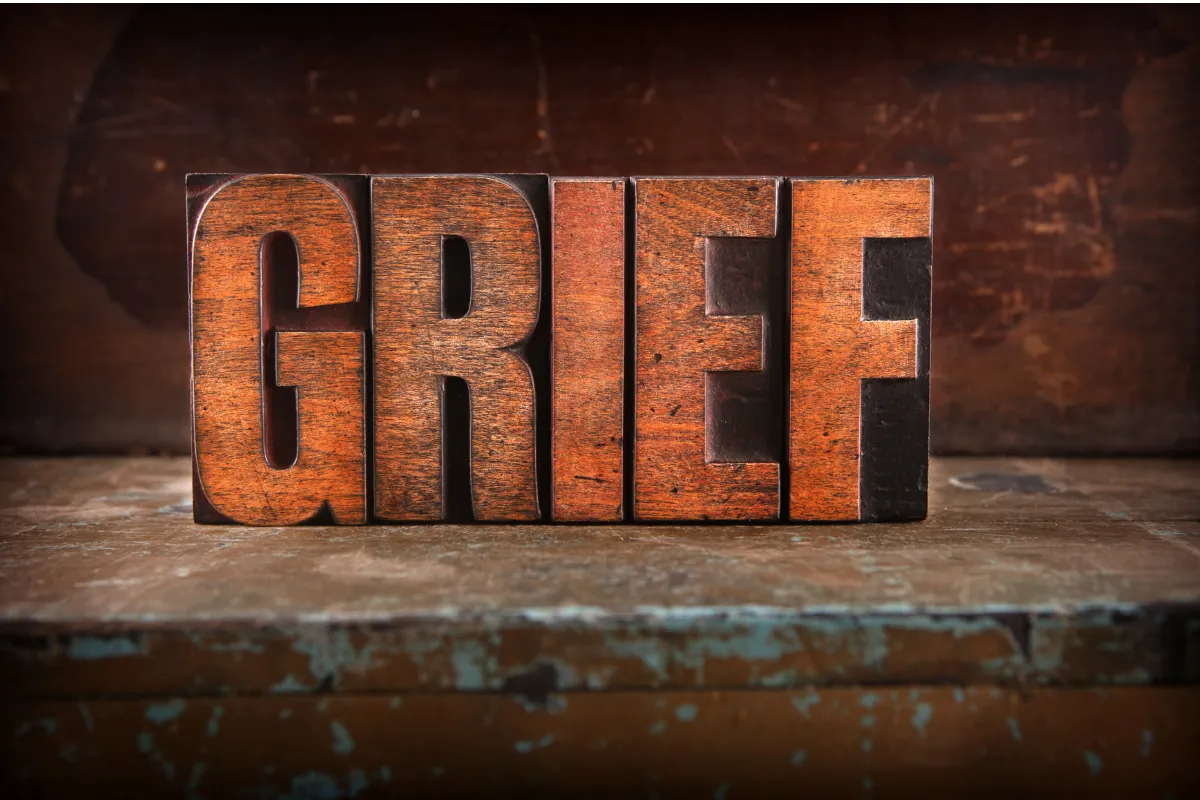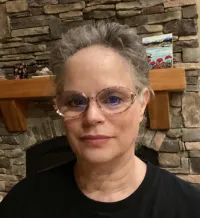
You don't have to eat your way through grief
You don't have to eat your way through grief.
One of the big triggers for emotional eating is grief, especially around the winter holidays when we are used to spending time with family and friends.
Grief is our natural response to a loss.
We are used to thinking of grief as being the response to loss of a person we care about, but it can be for other things as well, including our pets, relationships, jobs, homes, a part of our identity, or even a habit we give up voluntarily, such as overeating, alcohol use, or smoking. And it's important to recognize all of those types of loss.
But the loss of a loved one is the hardest loss we bear. And some of us, even though we don't want to, eat our way through that as a coping mechanism.
The good news is, while we all have to experience grief at times, we can let go of the need to eat in response (read all the way to the bottom of this article for the most powerful way to do so).
First of all, grief is normal and natural. And it takes time to go through the process.
Note that you don't necessarily ever get over the loss of a loved one. But you can, over time, find enough peace to have it not control every moment of your life.
At the beginning, grief is overwhelming, and often comes in waves that can bring you sobbing to your knees. Over time the intensity of this usually wanes, and you are able to think of the person without feeling soul-crushing pain. For some, this never happens and they experience an unusually disabling or prolonged response to bereavement. But most people manage to get through the worst of it within about 12-24 months.
The circumstance is the loss. What makes grief so different for each person is that grief is our own thoughts and feelings about the loss. So no two people experience it exactly the same way.
When we are facing a loss (or even anticipating facing a loss), we have to find ways to deal with the grief, which may include many emotions, including, but not limited to:
Sadness
Resentment or anger about what is happening, or even towards the person themself, or about how much we had to give up as caregivers
Guilt
Regret
Loneliness
Anxiety
Worry
Fear
Stress
Despair
All of these emotions, and others can trigger urges to eat for people who tend to be emotional eaters. We eat (or drink, or whatever the behavior is) in order to temporarily push away these negative feelings.
The problem is that the feelings always come back and the relief from the food or alcohol (or whatever) is only temporary. And then after the eating, or drinking, or whatever, we may find ourselves feeling shame and beating ourselves up for giving in to the urges, even though we swore we wouldn't do so.
And that shame and blame game doesn't help us either. In fact, it stresses us out even more, and raises the blood levels of stress hormones like cortisol, which make us want to eat even more.
So what can we do to help ourselves?
Well, if eating or drinking are what we do when we are subconsciously trying to avoid our emotions, what if we flip it upside down and do the opposite?
What if we instead allow ourselves to feel our emotions?
This doesn't mean we have to torture ourselves with needless suffering. If you put your hand on a hot stove, you wouldn't just leave it there.
But the truth is that unless we actually make space for the emotions, allow ourselves to experience them, and process them, we can't actually move forward.
Note: when I say move forward, I do NOT mean letting go of your love for the person or your relationship with them. In fact, it is fear of doing this that makes it so hard to let go of the pain.
But over time, you can let go of the pain without letting go of the love or the relationship.
There are many models of grief in the literature. Below are some suggestions based on these models that I find helpful for people who are struggling with grieving.
Remember that even after someone you love dies, your relationship with them remains. One of the things that makes people hold on so tightly to grief is that they sometimes feel like they are giving up the relationship if they stay stuck in the feelings.
But relationships are actually our thoughts about another person and that doesn't go away when someone dies. In fact, if there is something you don't like about the relationship or that was not resolved while the person was alive, you can still change the relationship even after someone is dead.
It turns out that trying to avoid our feelings only makes them stick around longer and keep hurting us. Allowing ourselves to feel them, even if we need to do it in small chunks, is what allows us to progress.
At the beginning when you lose someone, there is practically nothing but the pain of the loss.
But gradually you may find that you can allow in a few other feelings, even if only for a brief moment - someone might remind you of a funny story about the person, and you find yourself smiling or laughing even through your tears.
Over time, if you allow yourself to feel all of the feelings, more of those happy memories will come in and some of the pain will become less intense, even though you will still always miss the person.
Allow yourself to feel the negative emotions as they come, and the physical sensations and feelings that accompany them.
Give yourself permission to feel any and all feelings, even if what you are feeling is not only sadness but intense anger at the person for dying. All of those emotions are normal.
Surrender to the emotion. Just allow yourself to be present to it and sit with it. Journaling can be a great way to allow yourself to feel and express your feelings.
Stop judging yourself for feeling whatever it is you feel. And for heaven's sake, stop judging yourself for judging yourself!
Forgive yourself for whatever feelings you are experiencing.
Forgive yourself for anything you said or didn't say, or that you did or didn't do.
If you are thinking that you shouldn't be feeling angry, or guilty, or relieved, or whatever, you are probably trying to avoid that emotion.
Instead, try to just let it happen. Just let yourself feel it.
Notice your thoughts and your emotions, and how they feel in your body.
But don't just analyze the thoughts. Actually feel the feelings.
When you do this, the urge to eat or drink in response will diminish.
Here are some things that many people find helpful as they navigate through grief and loss - note that some are ways to remember the person, and others are ways to give yourself a break from painful thoughts (in a healthy way).
Keeping some of the person's belongings to remember them by
Looking at photos
Keeping some rituals you shared
Carrying on the person's legacy
Spending time with friends or family
Exercise or other physical activities
Sewing or other hobbies
Music or art activities
Having said all of that...there is more that you can do in order to keep yourself from eating in response to your emotions, and it doesn't involve willpower.
The super-Ninja trick for avoiding eating or drinking in response to grief or other emotions is to actually recognize what it is about feeling those emotions (or more precisely, trying to avoid feeling those emotions) that makes you want to eat in the first place, and let go of the desire to eat as a response to the trigger.
What if you could feel the feelings but not even have the urge to eat in response, rather than what you do now, which is either give into the urge or struggle to fight it off?
And what if your feelings just didn't tear you up inside the way they do now? What if you could experience them without being held hostage by them?
If you want to know more about how to release your cravings, emotional eating, and self-sabotage, I will be gifting a limited number of complimentary 90-minute End Emotional Eating Breakthrough/Discovery calls over the next 2 weeks.
At your breakthrough session you will:
➤ Create a crystal-clear vision for the ideal life you'll be living in your new, slim, healthy body.
➤ Uncover hidden challenges and weight loss blockers that may be sabotaging your weight loss efforts.
➤ Leave this session renewed, inspired, and ready to finally lose all of the weight you want - once and for all.
If you are tired of being a slave to your cravings and emotional eating and you want to break free of them without dieting or restriction, and without giving up the foods you love, and are willing to put in a little time and energy to do so, please click the link below to schedule.
Book your discovery call now (be sure to select the 90-minute discovery call option to allow us more time together to do a deep dive into what you want to achieve, how to get it, and what might be holding you back)!
To receive more content like this right to your inbox, click here:
Write to me at [email protected] to let me know what you'd like help with, or book a call:
Stress/overwhelm/work-life/relationship issues: endselfsabotagenow.com
Weight loss or emotional eating: releaseemotionaleating.com
Release It! ...Forever/
Thriving Beyond Cancer
Premium Coaching
...With Dr. Jill Rosenthal
Email: [email protected]
Copyright 2025 Release It!...Forever LLC

